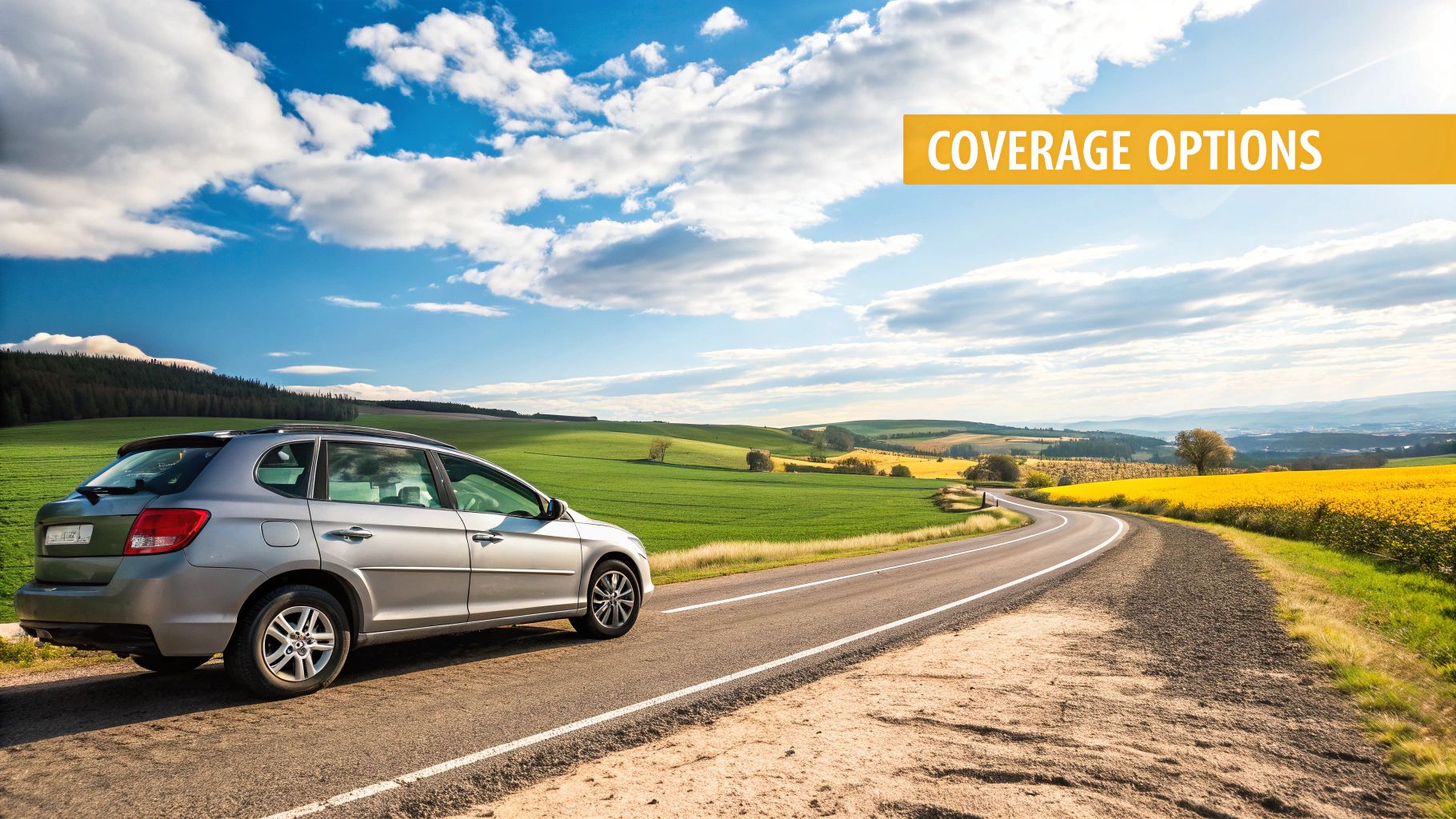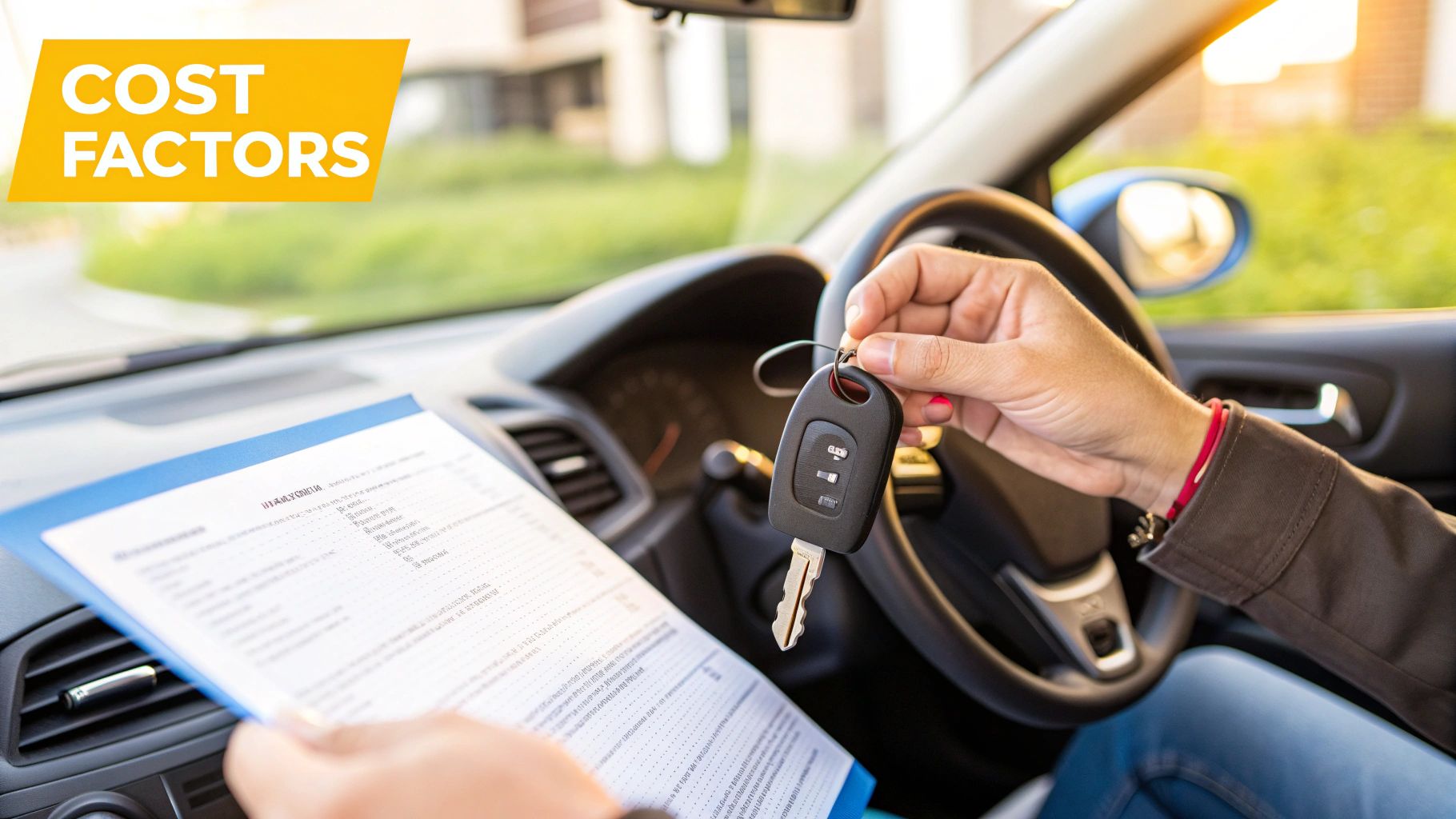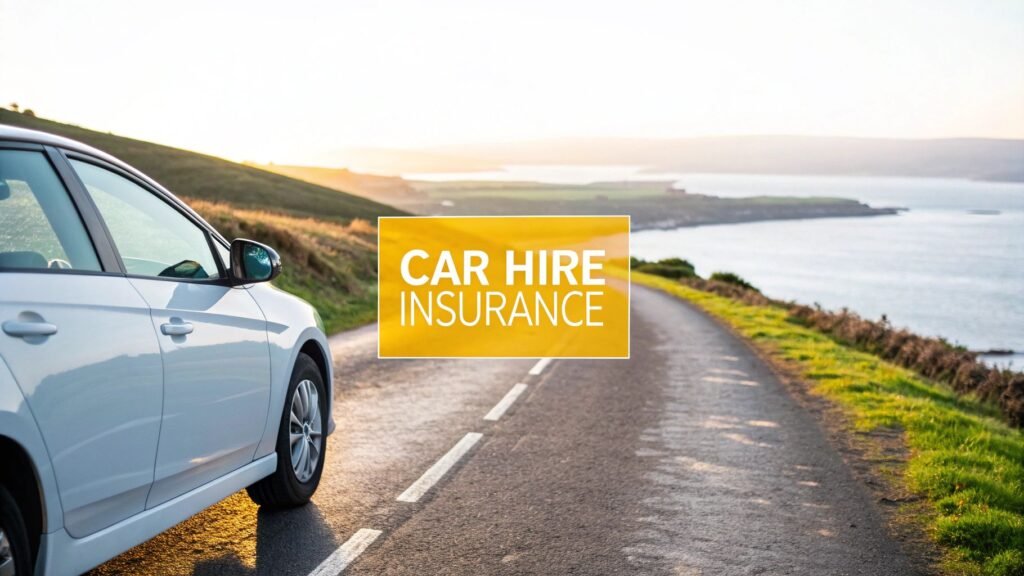Planning a self-drive tour across the UK is an exciting prospect, but the insurance offered at the rental desk can often leave you financially exposed. Think of specialised travel insurance for rental cars as your essential safeguard—it's a separate policy designed to cover the gaps and high excess charges that standard rental agreements don't.
Why Your UK Road Trip Needs The Right Insurance
There's nothing quite like the freedom of a road trip, but that freedom comes with responsibilities, especially when you're driving a hire car. The basic insurance included with your rental—often called a Collision Damage Waiver (CDW)—isn't nearly as comprehensive as its name suggests. It's a bit like having a leaky umbrella in a downpour; it offers some protection, but you can still get soaked by hefty financial penalties if something goes wrong.
This is where the term ‘excess’ becomes incredibly important.
The excess is the chunk of money you're on the hook for if the car is damaged or stolen, even with the rental company's standard cover. This figure can easily be anywhere from £1,000 to over £2,000, which is a significant and often unexpected financial hit.
Closing the Coverage Gap
A dedicated travel insurance for rental cars policy, often called Car Hire Excess Insurance, is designed specifically to plug this hole. Instead of just lowering what you'd have to pay, its goal is to get that amount down to zero by reimbursing you for the full excess you were charged.
This specialised cover gives BTOURS travellers a solid safety net, offering peace of mind for all sorts of common road trip mishaps:
- Accidental Damage: This covers everything from a minor scrape in a supermarket car park to more serious collision damage.
- Theft Protection: If the worst happens and the vehicle is stolen, you won't be left paying the high theft excess.
- Excluded Parts: It often covers the bits and pieces that a rental firm's basic policy ignores, like the tyres, windows, roof, and undercarriage.
At the end of the day, sorting out the right policy before you set off to explore the stunning landscapes of England isn't just an optional extra. It’s the first step towards a genuinely worry-free adventure on the road.
Decoding Rental Car Insurance Jargon
Ever stood at a car rental desk feeling like you’re being quizzed? All those acronyms—CDW, TP, SLI—can make your head spin. But getting your head around them is the secret to protecting your holiday budget from unexpected hits. Let's cut through the jargon and see what this all really means for your self-drive adventure.
Think of the insurance included with your rental car as a very basic safety net. It almost always includes a Collision Damage Waiver (CDW) and Theft Protection (TP). Now, CDW isn't technically insurance in the traditional sense. It's more of a promise from the rental company that they won't charge you the full value of the car if it gets damaged. Likewise, TP limits your liability if the car is stolen.
The catch? Neither of them completely removes your financial risk. They just cap it at a certain amount, and that amount is called the excess.
Understanding The Excess
If there’s one term you need to remember, it’s this one. The excess is the non-negotiable amount you are responsible for paying out of your own pocket if the car is damaged or stolen. Only after you’ve paid this amount does the rental company's cover start to contribute.
This is where so many travellers get caught out. The excess can be a shockingly large sum, often anywhere from £1,000 to over £2,000. A simple scrape against a bollard or a stone chip that cracks the windscreen could easily result in a bill for that entire amount, taking a huge bite out of your spending money.
This is exactly why sorting out the right insurance beforehand is so important. It lets you focus on the road ahead, not the potential "what ifs".

Ultimately, great cover buys you peace of mind. You can hit the open road knowing a minor mishap won’t turn into a major financial headache.
What About Third-Party Liability?
Good news here. In the UK, every rental car is legally required to have Third-Party Liability (TPL) insurance. This covers you for any injury or damage you might cause to other people or their property. It’s absolutely essential, but it does nothing to cover the hire car itself. That’s where the CDW and its massive excess come back into the picture.
To avoid that scary excess, rental companies will often try to sell you their own Excess Reimbursement Insurance (ERI) at the desk. Be prepared for a shock—these policies can cost between £25 and £60 per day.
A much smarter and more affordable option is to buy a standalone policy before you travel. Not only is it cheaper, but it also provides far more comprehensive cover, with maximum claim values ranging from £6,000 to £100,000. Getting a grasp on understanding different types of car-related insurance can really help put these different policies into perspective.
Standard Rental Cover vs Standalone Travel Insurance for Rental Cars
The difference between the basic cover you get at the desk and a specialised policy you buy yourself is night and day. This table breaks it down.
| Coverage Feature | Standard Rental Desk Cover (CDW/TP) | Standalone/Excess Reimbursement Policy |
|---|---|---|
| Excess Payable | Yes, typically £1,000 – £2,000+ | No, excess is reimbursed to you |
| Tyres & Windows | Usually Excluded | Often Included |
| Roof & Undercarriage | Almost Always Excluded | Typically Included |
| Lost Keys | Not Covered | Frequently Covered |
| Cost | High Daily Rate at the Counter | Low-Cost, One-Off Payment in Advance |
As you can see, the standalone policy fills all the critical gaps left by the rental company's standard offering. It covers the parts of the car most vulnerable to damage—like tyres, windows, and the undercarriage—which are almost always excluded from a standard CDW. It's a small investment for a huge amount of security.
The Hidden Gaps in Your Existing Insurance

It’s a thought that crosses every traveller's mind: "I'm already covered, right? My personal car insurance or credit card should handle it." It's a common assumption, and frankly, a costly one. While those policies might give you a sense of security at home, relying on them for a self-drive tour in the UK can leave you seriously exposed.
Think of it this way: your personal car insurance is designed for your own car, in your home country. Expecting it to seamlessly cover a rental vehicle abroad is like hoping your house keys will unlock a hotel room in London. It just wasn't built for that. Most domestic policies offer very little, if any, protection for hire cars, especially outside your home country. The geographical limits are a huge hurdle, and coverage rarely transfers internationally.
Before you mentally tick that box, you need to dig into the fine print. You'll likely find your standard policy falls short when you're behind the wheel of a rental on UK roads.
The Credit Card Conundrum
Many travellers believe their premium credit card is their trump card. It's true, many cards shout about their rental car insurance perks, and they can be useful. However, this "perk" is often tangled in a web of conditions and exclusions that can easily trip you up. It's rarely the straightforward, comprehensive cover you might imagine.
Here’s the catch, and it’s a big one.
To even activate the cover from most credit cards, you must first decline the rental company's own Collision Damage Waiver (CDW). This is a massive gamble. If your credit card company finds any reason to deny your claim later on, you are suddenly on the hook for the entire cost of the damage yourself.
It's a high-stakes move that most people don't even realise they're making. The convenience of paying by card can easily mask the potential for a financial nightmare.
Common Exclusions You Cannot Ignore
The real story is always in the terms and conditions. Dive into your credit card's policy, and you’ll find a list of things they simply won't cover. This is where many well-laid plans for a UK road trip can come unstuck.
Keep a sharp eye out for these typical exclusions:
- Vehicle Types: Fancy hiring something adventurous? Bad news. Vans, motorhomes, campervans, and most luxury or high-performance cars are almost always on the exclusion list.
- Rental Duration: Planning an extended tour? Many policies have a time limit, often capping cover at 28 or 30 days. This could leave you uninsured for the last leg of a longer BTOURS itinerary.
- Geographical Limits: Don't assume cover is valid everywhere in the UK. Some policies may have bizarre exclusions for certain regions or countries.
- Specific Damages: Just like the rental desk's basic CDW, credit card policies often won't cover the parts most likely to get damaged on country roads—think tyres, windscreens, and the undercarriage.
Your number one priority before you fly should be to get on the phone. Call your personal car insurer and your credit card provider. Ask them direct, specific questions about their travel insurance for rental cars for your trip to the UK. Get everything confirmed, preferably in writing. Never, ever assume you're covered. It’s a risk that’s just not worth taking.
The Real Financial Risks of Driving Uncovered

Let's be honest, getting a minor scrape on a rental car used to be a minor inconvenience. Those days are well and truly over. The financial dangers of driving without full cover have skyrocketed, catching even seasoned travellers by surprise. It's a perfect storm of rising inflation and increasingly complex cars, meaning a simple repair can now land you with a shockingly high bill.
Think about it: modern cars are practically computers on wheels. They're loaded with sophisticated sensors, cameras, and advanced driver-assistance systems. A small knock to a bumper isn't just a paint job anymore. It can easily damage sensitive electronics that cost a fortune to recalibrate or replace. This quiet tech revolution has pushed average repair costs through the roof, turning a minor mishap into a major financial headache.
Damage Beyond Your Control
Here’s the frustrating part. Most damage doesn't happen in some dramatic high-speed chase. It happens in the most mundane, everyday situations, and often, it's not even your fault.
A deep dive into recent insurance trends revealed something quite startling: over 60% of damage claims come from incidents completely outside the driver’s control. We're talking about car park dings, runaway shopping trolleys, storm damage, or even accidentally putting the wrong fuel in the tank. If you're interested, you can read more about the key rental car insurance trends you need to watch.
This means that no matter how careful you are behind the wheel, you’re still exposed to costs caused by other people's carelessness or just plain bad luck.
The Staggering Cost of a Small Mistake
To really bring this home, let's talk numbers. The average repair cost that rental companies are charging is now around £930. Without the right excess insurance, that entire bill comes straight out of your holiday fund. Suddenly, the freedom of the open road on a journey like the Taste of England 8-Days Self-Drive Tour starts to feel a lot more stressful.
This is precisely why we see comprehensive travel insurance for rental cars as non-negotiable. It’s not an upsell or a luxury; it’s essential financial protection. A good standalone excess reimbursement policy can turn that potential £930 bill into a minor inconvenience you barely have to think about. It’s what lets you focus on enjoying historic castles and scenic drives, instead of worrying about a crippling repair invoice ruining your trip.
How To Choose The Right Rental Car Policy
Picking the right travel insurance for your rental car can feel a bit like navigating a maze, but it doesn't have to be complicated. Let's cut through the jargon and focus on what really matters for your trip, so you can choose a policy with confidence and get total peace of mind.
Think of it like packing for your holiday. You wouldn't just chuck random clothes in a bag, would you? You’d consider the weather, what you'll be doing, and how long you're going for. Choosing insurance is the same; it's about making a thoughtful choice to get exactly what you need, without paying for extras you don't.
Check Your Excess Limit First
The very first thing to look at is the excess limit. This is simply the maximum amount of money the policy will pay out if the rental company charges you for damage or theft. So, your first step is to grab your car rental booking and find out what the excess is.
Make sure the insurance policy's coverage is higher than the rental company's excess charge. For example, if your rental car has a £2,000 excess, a policy that only covers up to £1,500 leaves you £500 out of pocket. You always want a comfortable buffer.
Getting this one check right is the foundation of a good choice and stops you from being underinsured.
Look for Comprehensive Coverage
Not all policies are created equal. It's tempting to just grab the cheapest one, but that often means you're left with big gaps in your cover. The best policies protect you against the kind of damage that's most likely to happen on those beautiful, scenic drives.
Look for a policy that specifically covers these problem areas:
- Tyres and Wheels: Absolutely vital when you're exploring country lanes where potholes are a fact of life.
- Windows and Windscreens: A stray stone chip on the motorway is a common and surprisingly expensive fix.
- Undercarriage and Roof: Damage from bumpy tracks or low-hanging branches is often left out of basic policies.
- Lost Keys: Modern car keys can cost a fortune to replace, sometimes running into hundreds of pounds.
Making sure these are included means your protection goes way beyond a simple collision. It's this attention to detail that turns planning your next adventure, like one of our brilliant self-drive tours, into a genuinely worry-free experience.
Decide Between Single-Trip and Annual Policies
How often you travel will quickly tell you which type of policy makes the most sense for your wallet. It's a pretty simple choice.
- Single-Trip Policy: Perfect if you're only planning to rent a car once in the next year. It covers one specific holiday and is the cheapest route for occasional travellers.
- Annual Policy: If you'll be renting a car two or more times in a year, an annual policy will almost certainly save you money. It gives you cover for multiple trips all year round, usually for rentals up to 31 days at a time.
One last tip: always spend a few minutes reading the policy wording, especially the "Exclusions" section. This is where you'll find the small print about things like vehicle restrictions (vans or motorhomes are often excluded) or driver age limits. Five minutes of reading now could save you a massive headache later on.
Navigating The Claims Process Step By Step
Discovering a dent in your hire car is that heart-sinking moment every driver dreads, but it doesn't have to torpedo your holiday. When you've got the right travel insurance for rental cars, you’re already prepared. Knowing what to do next just keeps you in the driver's seat. The trick is to stay calm and follow a clear process to make sure your claim is handled without a hitch.
Let's say you've just spent a lovely afternoon exploring a historic castle, only to return to the car park and find a long, ugly scrape down the side. Your first move? Document everything, right then and there. This is your evidence, and it’s gold.
What to Do Immediately at the Scene
Don't move the car. Don't put it off. Your priority is to build a crystal-clear record of what happened before anything changes. A few minutes spent here can save you a world of headaches later on.
- Take Photos and Videos: Get your phone out and go to town. Snap pictures of the damage from every conceivable angle—get close-ups of the scratch, then step back to show the car and its surroundings. A quick video walk-around is a great idea, too.
- Gather Information: If someone else was involved, calmly exchange details. You'll need their name, phone number, address, and insurance information. If any passers-by saw what happened, politely ask if they’d be willing to be a witness and get their contact details.
- File a Police Report: For anything more than a minor ding, like significant damage, theft, or a collision, a police report is usually non-negotiable. Your insurer will almost certainly ask for it.
Once you’ve got all your evidence, your next call is to the rental company. They need to know what’s happened straight away and will tell you what their own procedures are.
Filing Your Claim for Reimbursement
When you return the car, the rental company will charge your credit card for the damage, up to the full excess amount. Now it’s time for your own insurance policy to step in and make you whole.
The process is simple, really: you pay the rental company's excess charge first, and then you claim that exact amount back from your insurance provider. It’s a straightforward reimbursement system that ensures you aren't left out of pocket.
You'll need to formally submit a claim to your insurer. They’ll ask for a bit of paperwork to get the ball rolling. Be ready to provide:
- The rental agreement you signed
- The damage report filled out by the rental desk
- Your final invoice showing the amount you were charged for the excess
- All the photos you took, plus the police report if you have one
In a worst-case scenario where the vehicle is written off, things can get more complicated. If you feel the valuation is unfair, knowing what to do if your rental car is totaled with an unfair insurance offer can be incredibly helpful. By following these steps, you can turn a truly stressful situation into a manageable one.
Got a Question About Your Rental Car Cover?
We get it. You're standing at the rental desk, keys almost in hand, and suddenly you're hit with a barrage of insurance questions. It can feel a bit overwhelming, but don't worry. We've put together answers to the most common queries we hear from BTOURS travellers, so you can feel completely prepared.
Think of this as your cheat sheet for making a smart, confident decision just before your road trip officially begins.
Do I Really Need the Extra Insurance They Offer at the Desk?
This is the big one. The short answer is: if you’ve already bought a separate, comprehensive Car Hire Excess Insurance policy, then no, you almost certainly don't need the pricey add-ons they're offering. Your pre-purchased policy is designed to do exactly what their expensive cover does—protect you from that hefty excess charge.
So, you can politely say "no, thank you." Just be prepared for them to place a significant security hold on your credit card. This is completely standard practice, and the hold is released once you return the car in one piece.
Key Takeaway: A standalone policy bought in advance is your best bet. Be ready to decline the desk offer and expect the credit card security hold—it's all part of the process.
What If I’m Hiring a Van or a Motorhome?
This is a crucial point that catches a lot of people out. Most standard car hire excess policies are just that—for cars. They will not cover larger vehicles. This usually includes vans, motorhomes, campervans, and often high-performance or luxury cars too.
If your adventure involves anything bigger than a typical passenger car, you absolutely must find a specialised policy that clearly states it covers your type of vehicle. Before you buy anything, scan the policy's exclusion list to make sure you'll actually be protected.
Is It Cheaper to Buy Insurance Before I Go or at the Counter?
Buying in advance is nearly always the cheaper, smarter option. In fact, it's not even close. The insurance sold at the rental desk is notoriously expensive; it's a huge money-maker for the rental companies.
By sorting your cover out before you even leave home, you give yourself time to compare policies, find better coverage, and save a good chunk of cash. The daily rates they charge at the counter simply can't compete with the value you get from a standalone policy booked ahead of time.
At BTOURS, we believe a brilliant road trip is a worry-free one. Securing the right insurance beforehand lets you focus on the road ahead and the incredible views. Ready to plan your next adventure? Head over to https://www.btours.com and let's get started.



